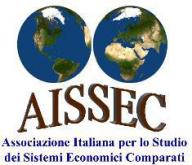15 | MAY 2020
Edited by Marta Marson, University of Turin and OEET
Newsletter n. 15| May 2020 - Download PDF
The 15th issue of the Emerging Economies newsletter includes three contributions about Covid-19 in emerging and advanced economies and about its implications for peace and stability. This time, we have two articles in Italian, with abstracts in English, and one in English, with abstract in Italian. Authors are Ignazio Musu, Vittorio Valli and Renata Targetti Lenti.
By Ignazio Musu, Università Ca’ Foscari di Venezia
China informed the World Health Organization about undefined cases of pneumonia and the risk of a new coronavirus at the end of December 2019, but it seems that a first group of cases of virus were detected since November 2019. The local authorities in the province of Hubei and the city of Wuhan not only did not take appropriate measures when informed by doctors and researchers about the risk of an epidemic from the new coronavirus, but took steps to prevent the diffusion of the information. Only in January the national government took the initiative not only arriving at the lockdown but drastically changing the local leaders and health authorities of Hubei and Wuhan. No mention of these weaknesses is made in the World Health Organization report published at the end of February, that informed of the success of the China’s fight against the new epidemic; they are also ignored in another Chinese almost official report published at the end of April. Although the success of the China’ action in facing Covid-19 cannot be denied, particularly because of the use of advanced digital technologies and applications of artificial intelligence, misbehavior and delays of the local and even national Chinese leadership provided arguments to worsening the geopolitical relation between China and the Western countries, particularly with the United States. The reaction of the United States is dangerous at the global level where international cooperation is required not only to improve cures for the pandemic and find a vaccine, but also to take required actions to protect biodiversity in order to prevent and control new epidemics from wildlife and ecosystems’ destruction.
By Vittorio Valli, University of Turin; Fondazione L. Einaudi -Torino and OEET[1]
Questo scritto è una rielaborazione in lingua inglese, arricchita ed aggiornata al 22 maggio 2020, della nota del 13 Aprile 2020, che era stata pubblicata in lingua italiana su questo sito. La tesi principale è che l’Italia e, in successione, diversi altri paesi occidentali come il Belgio, la Spagna, il Regno Unito, la Francia, la Svezia e gli Stati Uniti, non hanno imparato, né dalla Cina, né dalle grandi democrazie dell’Est Asia, come il Giappone e la Corea del sud, a reagire con adeguata prontezza ed efficacia alla devastante avanzata della pandemia. Essi hanno quindi pagato un prezzo assai più alto dell’Est Asia in termini di decessi e di crisi economica e sociale. Questo dipende soprattutto da quattro fattori. Il primo è il vasto e ingenuo uso di dati fuorvianti ed inaffidabili come i “casi positivi ai test” come indicatore principale del livello e degli andamenti dei “contagi”, che invece sono un numero sconosciuto e grandemente più elevato. Il numero di casi positivi dipende infatti dal numero di test fatti, dalle priorità con cui sono stati fatti, dalla fase della pandemia e dalle politiche di contenimento messe in atto in ogni periodo dai governi. Inoltre questo indicatore non tiene conto il più delle volte dei contagiati asintomatici che contribuiscono fortemente alla diffusione della pandemia. Un dato assai meno incerto, sebbene anch’ esso variamente sottostimato, è quello dei decessi attribuibili al Covid-19. Secondo questi dati, il confronto, ad esempio, tra la Corea del sud e l’Italia, ma anche altri paesi occidentali, è impietoso. Fino al 22 maggio 2020 la Corea del Sud aveva avuto 5 morti per ogni milione di abitanti, l’Italia 539, la Spagna 612, il Regno Unito 536, la Francia 433, gli Stati Uniti 295 ed il Belgio addirittura 795. Perfino paesi più accorti, come Germania e Grecia, avevano avuto rispettivamente 100 e 16 morti per milione di abitanti. Gli altri fattori principali sono il ritardo della conoscenza, la presunzione dell’Occidente e le ragioni economiche e sociali che hanno influenzato i governi nazionali e regionali. Quest’ ultimi non hanno avuto il coraggio politico di reagire prontamente e con adeguata efficacia all’attacco della pandemia. Le analisi comparate tra le politiche dell’Italia e della Corea del Sud e, all’interno del Nord Italia, tra la Lombardia ed il Veneto, oltre all’esame dell’importante caso della cittadina veneta di Vo’, consentono di comprendere meglio il grande contrasto tra le politiche adottate nella Corea del sud e in Italia ed i loro esiti e quello tra il disastro lombardo e la pesante, ma più contenuta, esperienza del Veneto.
By Renata Targetti Lenti, University of Pavia[1][2]
The article is based on a review of Scheidel's book “The Great Leveler: Violence and the History of Inequality from the Stone Age to the Twenty-First Century”, on the drivers of inequality reduction in European economic history. The core idea is that major disruptive events and epidemies were the main events levelling inequality, from ancient times to date. Other studies, focusing on more limited time and areas, confirm similar findings. Based on the analysis of the experience of European societies during the first months of Covid-19 pandemics and on its realistic projections for the next future, the article points to a sharp contrast with those findings. So far, the effects that can be identified operate towards increasing inequality, particularly when dimensions of inequality beyond income and wealth are considered, like equality of opportunities in health and gender disparity.
Our activities
-
AFRICA: DEVELOPMENT, SUSTAINABILITY AND GREEN TRANSITION
Tuesday, January 27th 9.45 – 17.00 Aula SV002, Università Cattolica del Sacro Cuore; Via San...









